2022年中考英语(人教版)一轮复习七年级上册Units 5-9课件(82张PPT)
文档属性
| 名称 | 2022年中考英语(人教版)一轮复习七年级上册Units 5-9课件(82张PPT) | 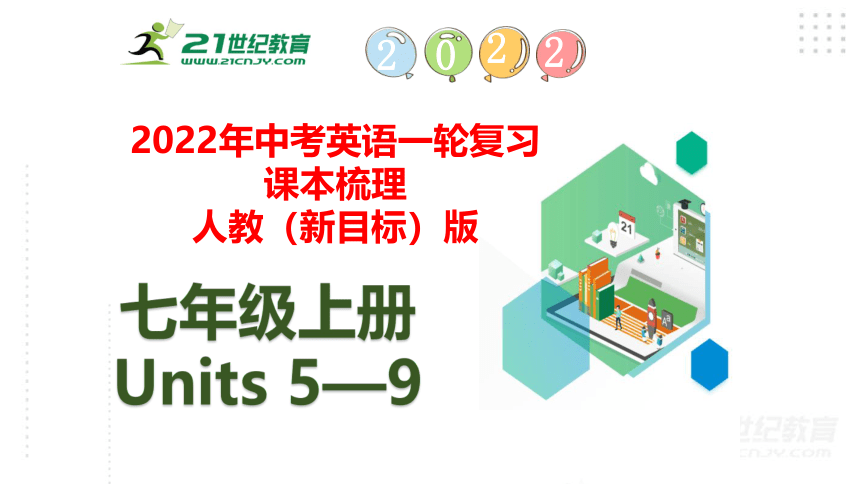 | |
| 格式 | pptx | ||
| 文件大小 | 1.5MB | ||
| 资源类型 | 试卷 | ||
| 版本资源 | 人教新目标(Go for it)版 | ||
| 科目 | 英语 | ||
| 更新时间 | 2022-01-17 11:55:08 | ||
图片预览

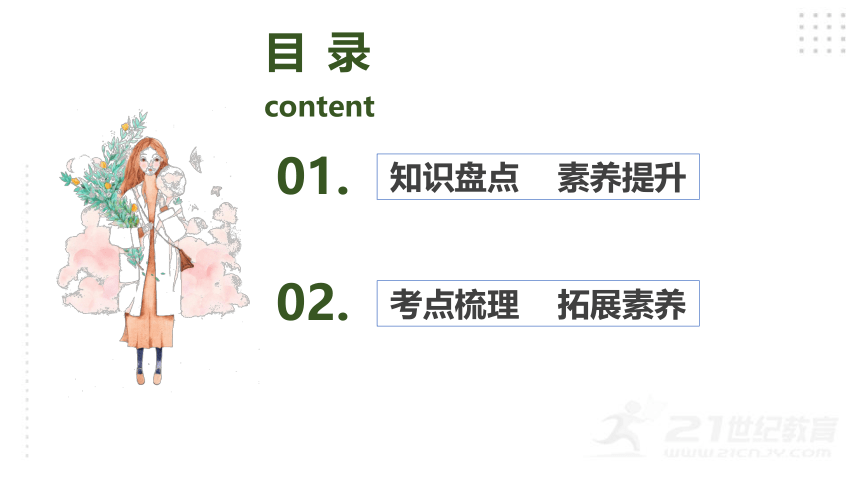
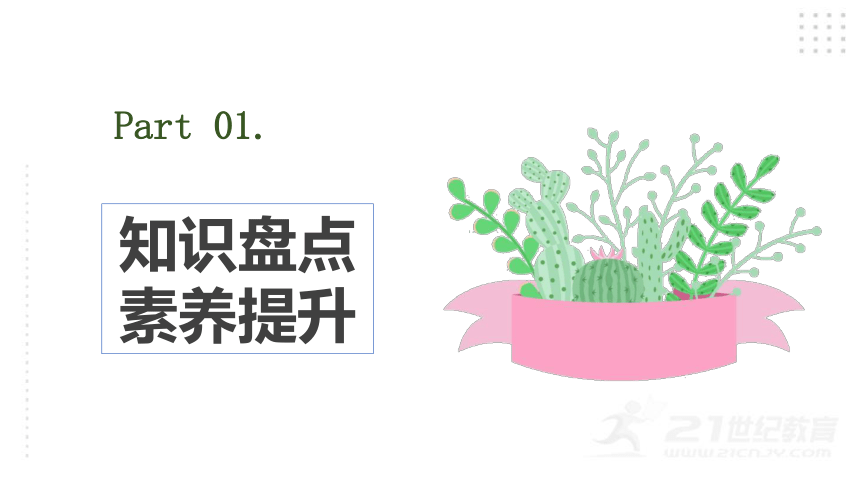
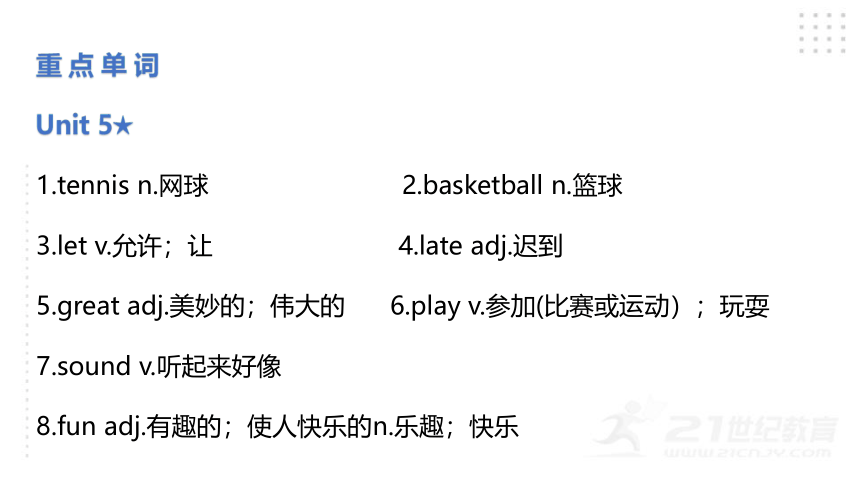
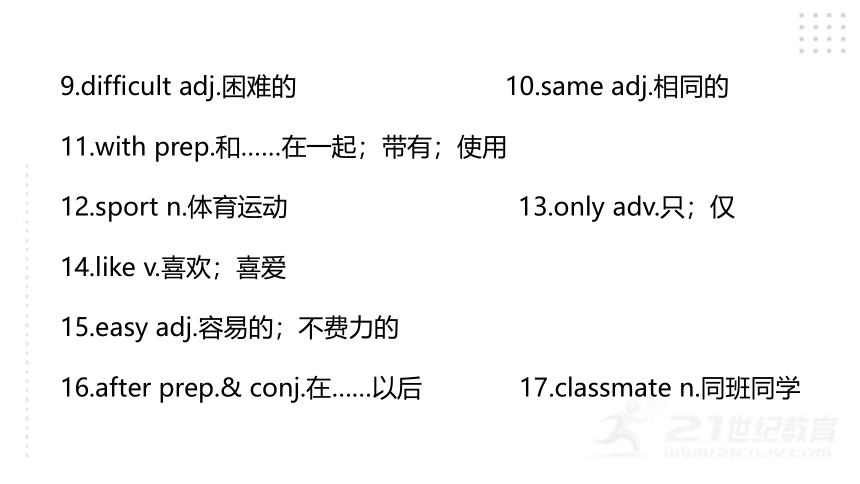
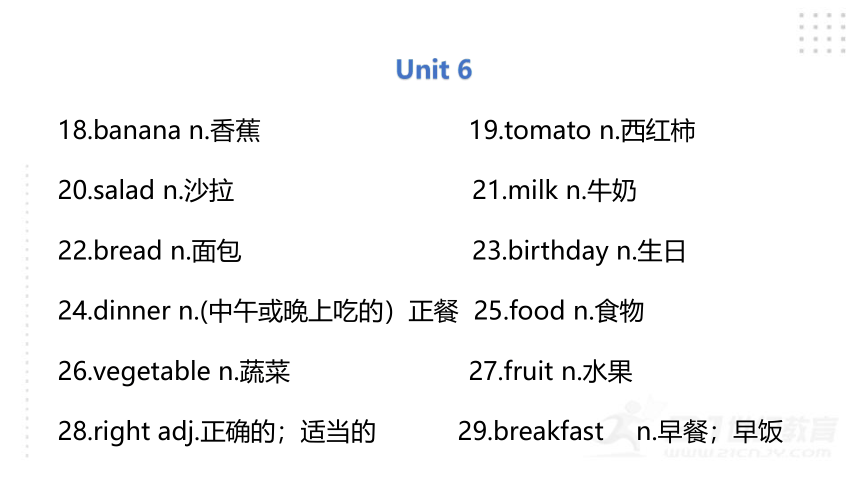
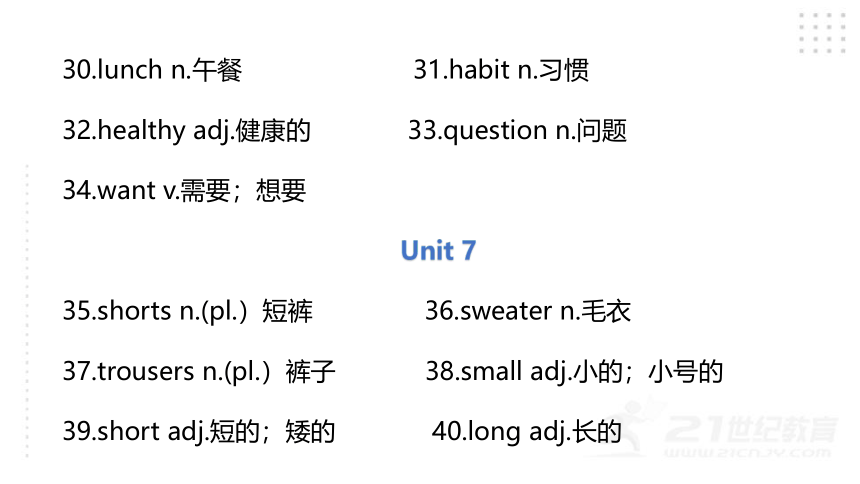
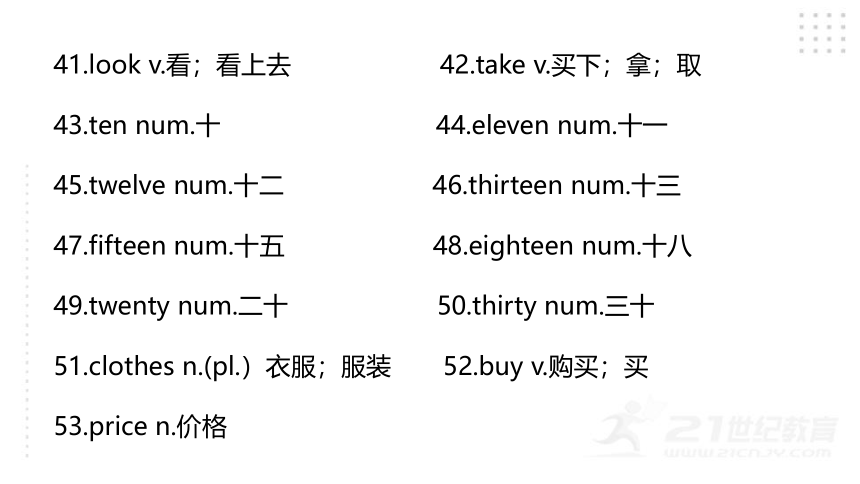
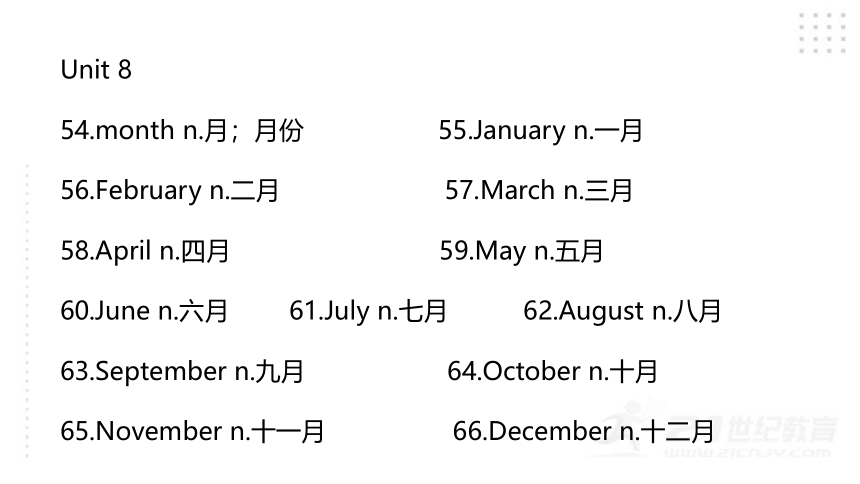
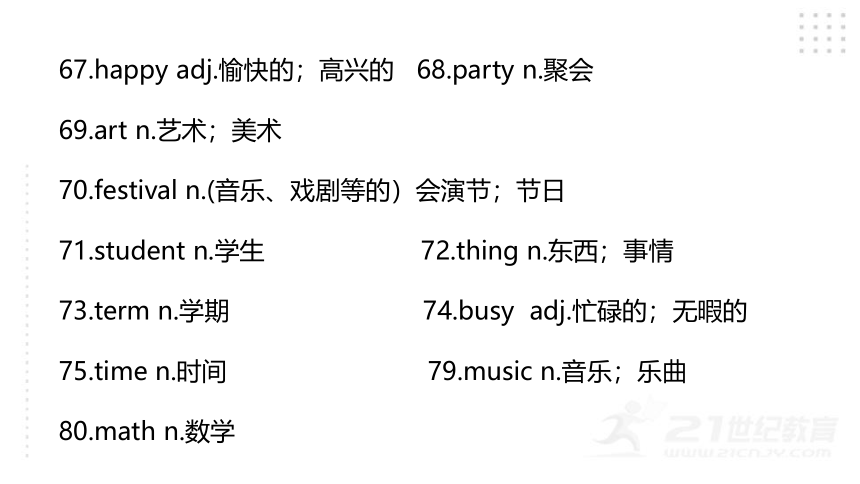
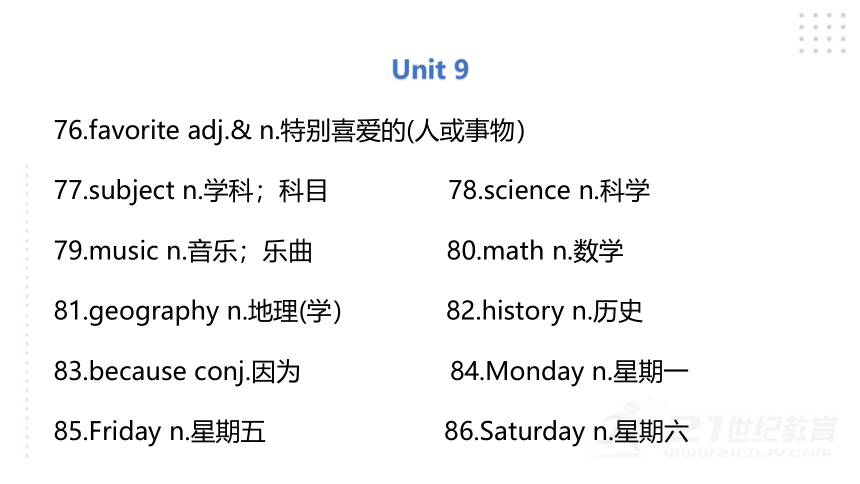
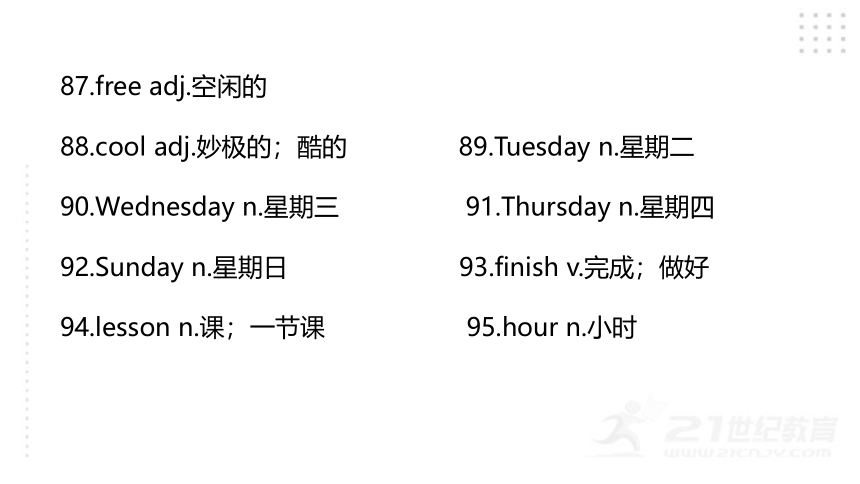
文档简介
(共82张PPT)
2
0
2
2
2022年中考英语一轮复习
课本梳理
人教(新目标)版
七年级上册
Units 5—9
知识盘点 素养提升
考点梳理 拓展素养
目录
content
01.
02.
Part 01.
知识盘点 素养提升
重 点 单 词
Unit 5★
1.tennis n.网球 2.basketball n.篮球
3.let v.允许;让 4.late adj.迟到
5.great adj.美妙的;伟大的 6.play v.参加(比赛或运动);玩耍
7.sound v.听起来好像
8.fun adj.有趣的;使人快乐的n.乐趣;快乐
9.difficult adj.困难的 10.same adj.相同的
11.with prep.和……在一起;带有;使用
12.sport n.体育运动 13.only adv.只;仅
14.like v.喜欢;喜爱
15.easy adj.容易的;不费力的
16.after prep.& conj.在……以后 17.classmate n.同班同学
Unit 6
18.banana n.香蕉 19.tomato n.西红柿
20.salad n.沙拉 21.milk n.牛奶
22.bread n.面包 23.birthday n.生日
24.dinner n.(中午或晚上吃的)正餐 25.food n.食物
26.vegetable n.蔬菜 27.fruit n.水果
28.right adj.正确的;适当的 29.breakfast n.早餐;早饭
30.lunch n.午餐 31.habit n.习惯
32.healthy adj.健康的 33.question n.问题
34.want v.需要;想要
Unit 7
35.shorts n.(pl.)短裤 36.sweater n.毛衣
37.trousers n.(pl.)裤子 38.small adj.小的;小号的
39.short adj.短的;矮的 40.long adj.长的
41.look v.看;看上去 42.take v.买下;拿;取
43.ten num.十 44.eleven num.十一
45.twelve num.十二 46.thirteen num.十三
47.fifteen num.十五 48.eighteen num.十八
49.twenty num.二十 50.thirty num.三十
51.clothes n.(pl.)衣服;服装 52.buy v.购买;买
53.price n.价格
Unit 8
54.month n.月;月份 55.January n.一月
56.February n.二月 57.March n.三月
58.April n.四月 59.May n.五月
60.June n.六月 61.July n.七月 62.August n.八月
63.September n.九月 64.October n.十月
65.November n.十一月 66.December n.十二月
67.happy adj.愉快的;高兴的 68.party n.聚会
69.art n.艺术;美术
70.festival n.(音乐、戏剧等的)会演节;节日
71.student n.学生 72.thing n.东西;事情
73.term n.学期 74.busy adj.忙碌的;无暇的
75.time n.时间 79.music n.音乐;乐曲
80.math n.数学
Unit 9
76.favorite adj.& n.特别喜爱的(人或事物)
77.subject n.学科;科目 78.science n.科学
79.music n.音乐;乐曲 80.math n.数学
81.geography n.地理(学) 82.history n.历史
83.because conj.因为 84.Monday n.星期一
85.Friday n.星期五 86.Saturday n.星期六
87.free adj.空闲的
88.cool adj.妙极的;酷的 89.Tuesday n.星期二
90.Wednesday n.星期三 91.Thursday n.星期四
92.Sunday n.星期日 93.finish v.完成;做好
94.lesson n.课;一节课 95.hour n.小时
重 点 短 语
1.play basketball 打篮球
2.play computer games 玩电脑游戏
3.watch TV 看电视
4.play sports 进行体育运动
5.watch ...on TV 通过电视观看……
6.after class/school 下课后/放学后
7.think about 思考;思索
8.How about ... (提出建议)……怎么样
9.eat well 吃得好
10.ask sb.about sth.询问某人关于某事
11.eating habits 饮食习惯
12.eat/like ...for breakfast/lunch/dinner
吃/喜欢……当作早餐/午餐/晚餐
13.How much ... (购物时)……多少钱?
14.at very good prices 以非常优惠的价格
15.a pair of 一双
16.How old ...? ……多大年纪?……几岁了?
17.English test 英语测试
18.school trip 学校旅行
19.School Day 学校开放日;学校活动日
20.book sale 图书售卖
21.art festival 艺术节
22.Sports Day 体育节;运动会
23.Have a good time! (表示祝愿)过得愉快!
24.for sure 无疑;肯定
25.from ...to ... 从……到……
词 汇 拓 展
1.have v.→ has (第三人称单数形式)有
→ had (过去式/过去分词)
2.we pron.→ us (宾格)我们
3.get v.→ got (过去式)去取(或带来);得到
→ got/gotten (过去分词)
→ getting (现在分词)
4.play v.→ player n.运动员;播放机
5.interest v.& n.→ interesting adj.有趣的
→ interested adj.感兴趣的
6.bore v.→ boring adj.没趣的;令人厌倦的
→ bored adj.(感到)烦闷的
7.difficult adj.→ difficulty n.困难;难题
8.relax v.→ relaxing adj.轻松的;令人放松的
→ relaxed adj.(感到)放松的;自在的
9.they pron.→ them (宾格)他(她、它)们
10.tomato n.→ tomatoes pl.西红柿
11.eat v.→ ate (过去式)吃
→ eaten (过去分词)
12.real adj.→ really adv.真正地
13.much adj.→ more (比较级)更多的
→ most (最高级)最多的
14.big adj.→ bigger (比较级)更大的
→ biggest (最高级)最大的
15.woman n.→ women pl.女子
16.take v.→ took (过去式)买下;拿;取
→ taken (过去分词)
17.buy v.→ bought (过去式/过去分词)购买;买
18.sell v.→ sold (过去式/过去分词)出售;销售;卖
→ sale n.特价销售;出售
19.happy adj.→ unhappy (反义词)不快乐的;不幸福的
→ happily adv.快乐地;幸福地
→ happiness n.幸福
20.one num.→ first (序数词)第一
21.two num.→ second (序数词)第二
22.three num.→ third (序数词)第三
23.five num.→ fifth (序数词)第五
24.eight num.→ eighth (序数词)第八
25.nine num.→ ninth (序数词)第九
26.twelve num.→ twelfth (序数词)第十二
27.twenty num.→ twentieth (序数词)第二十
28.free adj.→ freely adv.自由地
→ freedom n.自由
29.use v.& n.→ useful adj.有用的;有益的
→ useless adj.无用的
→ used adj.用过的;二手的
重 点 句 型
1.Let me get it.让我(去)拿(它)。
2.I don't have a soccer ball, but my brother Alan does .我没有足球,但我哥哥艾伦有。
3. After class ,I play ping-pong with my classmates.下课后,我和同学们一起打乒乓球。
4.I don't want to be fat.我不想变胖。
5.We sell all our clothes at very good prices .
我们卖的所有服装价格都很优惠。
6.For girls,we have skirts in purple for only $20.
针对女孩子,我们有仅售20美元的紫色裙子。
7.My classes finish at 1:50,but after that I have an art lesson for two hours.
我学校的课(下午)一点五十分结束,但随后我要上两个小时的美术课。
情 景 交 际
谈论物品所属
1.—Do you have a baseball 你有一个棒球吗?
—Yes,I do./No,I don't.I have a volleyball.是的,我有。/不,我没有。我有一个排球。
建议与回应
2.—Let's play basketball.让我们打篮球吧。
—That sounds good.那听起来很好。
谈论对食物的喜好
3.—Does she like tomatoes 她喜欢西红柿吗?
—Yes,she does./No,she doesn't.是的,她喜欢。/不,她不喜欢。
4.—What do you like for breakfast 你早餐喜欢吃什么?
—I love fruit.I think it's healthy.我喜爱水果。我认为它很健康。
购物
5.—Can I help you /What can I do for you 我能帮您吗?
—Yes,please.I need/want a sweater for school.是的。我需要为上学买一件毛衣。
6.—What color do you want 你想要什么颜色的?
—Blue.蓝色的。
7.—How about this one 这件怎么样?
—It looks nice.它看起来很漂亮。
8.—How much is this T-shirt/are these socks 这件T恤衫/这些短袜多少钱?—It's/They're seven dollars.七美元。
9.—Here you are.给你。
—Thank you.谢谢。
谈论日期
10.—When is your birthday 你的生日是什么时候?
—My birthday is/It's on May 2nd.我的生日是5月2日。
11.—When is the party 聚会是什么时候?
—At three this afternoon.今天下午三点。
生日祝福
12.—Happy birthday!生日快乐!
—Thank you.谢谢。
询问与告知年龄
13.—How old are you 你多大了?
—I'm twelve (years old)./Twelve.我十二岁。
谈论科目和任教老师
14.—What's your favorite subject 你最喜欢的科目是什么?
—My favorite subject is science./Science.(我最喜欢的科目是)科学。
15.—Why do you like music 你为什么喜欢音乐?
—Because it's fun.因为它很有趣。
16.—Who is your music teacher 你的音乐老师是谁?
—(My music teacher is) Ms.Xie.(我的音乐老师是)谢女士。
语 法
1.实义动词的一般现在时 2.连词but
3.可数名词和不可数名词 4.基数词和序数词
5.名词所有格 6.特殊疑问句
Part 02.
考点梳理
素养提升
... let's go!……(让)我们走吧!(Unit 5 P26)
考点1
【点拨】这是个以let开头的祈使句,其中let's是let us的缩写形式,句型结构为let sb.do sth.,意为“让某人做某事”,用来表示请求或建议。此处的sb.通常为代词宾格,sb.后面跟动词原形。如:Let's play football after school.放学后咱们踢足球吧。
(注:对于提建议的其他句型详见P4考点4【拓展】)
[否定形式:let sb.not do sth.]
【图解助记】
1.What's in the box Let me guess (猜).Is it a book
( D )2.—Look!Kangkang,that old man is crossing the crosswalk.
—Jane,let's him.
A.helps B.to help C.helping D.help
学
以
致
用
( C )3.(2021·湘西改编)—Let's go for a swim on Sunday,Mike.
—.I have to clean my room.
A.With pleasure B.That's all right
C.Sorry,I can't D.Good idea
It's on the chair.Let me get it.
它在椅子上。让我(去)拿(它)。(Unit 5 P26)
考点2
【辨析】carry,bring,take,fetch与get
这五个动词都有“拿;带”的意思,具体区别如下:
单词 含义 用法 例句
carry 搬;扛; 提;拿 可表示“随身携带”;不强调方向性,但有负重之意。 Jack can't carry the box.杰克搬不动这个箱子。
单词 含义 用法 例句
bring 拿来; 带来 把某物(人)从别处带到说话处,常与to连用。 Don't forget to bring your English book here tomorrow.明天别忘了把你的英语书带来。
take 拿走; 带走 把某物(人)从说话处带到别处,常与to连用,与bring方向相反。 Take these balls to the classroom,please.请把这些球拿到教室去。
fetch /get 拿来; 取来 去别处把某物(人)带来,强调动作的往返。 Could you fetch me my bag 你能否去把我的包取来?
【图解助记】
学
以
致
用
用carry,bring,take,fetch和get填空。
1.—Excuse me.How can I get to the zoo
—Bus No.17 will take you there.
2.—Amy,my iPhone is in my bedroom.Could you fetch/get it for me
—No problem.
3.Remember to bring your homework here tomorrow.
4.The box is too heavy for me to carry .
考点3
—Well,let's play basketball.嗯,我们一起打篮球吧。
—That sounds good.那听起来不错。(Unit 5 P27)
【点拨1】play含义较多,常见用法如下:
含义 用法 举例
参加 (比赛或 运动) play+球类/棋类名词 play football/basketball/chess
踢足球/打篮球/下国际象棋
play+某类活动名词的复数形式 play games/cards/sports玩游戏/玩牌/进行体育运动
含义 用法 举例
玩耍 play with sb./sth.与某人(物)一起玩耍 Bob is playing with his friends.鲍勃正在和他的朋友们玩耍。
弹拨,吹奏 (乐器); 演奏 play+the+乐器名词 play the guitar/piano/violin/drums弹吉他/弹钢琴/拉小提琴/敲鼓
播放 播放CD、视频等 play videos播放视频
含义 用法 举例
扮演 play sb.扮演某人 The part of Belle was played by Emma Watson.贝儿这一角色由艾玛·沃特森扮演。
起作用 play a role/part in (doing) sth.在……中发挥作用 Electricity plays an important part in our daily life.电在我们的日常生活中起着重要的作用。
注:play还可用作名词,意为“戏剧;剧本”。 1.Lily isn't interested in playing sports (进行体育运动),but she is fond of playing the piano (弹钢琴).
2.He often plays tennis (打网球) on the weekend.
3.Parents play an important role in deciding (decide) the success of their children's education.
学
以
致
用
【点拨2】sound在句中用作系动词,后接形容词作表语。与sound有类似用法的(感官)系动词还有look,smell,taste,feel等,它们通常都接形容词作表语。
【图解助记】
( A )4.(2021·河北)The trip really exciting to me.How I wish to go!
A.sounds B.smells
C.tastes D.feels
学
以
致
用
( D )5.(2021·无锡)—You added sugar in my tea It_________ terrible!
—Sorry,madam.I'll pour you another cup right away.
A.feels B.looks C.sounds D.tastes
( C )6.(2021·青海改编)Mom is cooking chicken soup.It so good.
A.sounds B.tastes
C.smells D.feels
( B )7.(2021·呼和浩特)—Listen! Amy,who next door
—Well,it's Cindy.Her voice always sounds just like a bird.
A.sings;sweetly
B.is singing;swee
C.sings;sweet
D.is singing;sweetly
( C )8.—Tom,please have some fish.
—Thanks.It tastes .I want more.
A.well B.awful
C.good D.terribly
9.(2021·大连)这个主意听起来真不错,让我们尝试一下吧。
This idea sounds good. Let's have a try.
sound look taste feel
10.(2021·丹东改编)Abing's Erquan Yingyue sounds sad and moving.
11.Silk feels more comfortable than cotton.
12.—Some of my friends eat with their eyes.They prefer to order what looks nice.
—Aha,me too!
13.—How does the banana milk shake taste
—Delicious.I'd like to have another glass.
【辨析】interesting与interested
单词 含义及用法 例句
interesting 指事物本身“令人感兴趣的;有趣的”,作定语或表语。 That's an interesting film.那是一部有趣的电影。
The book is very interesting.这本书很有趣。
interested 指人“对……感兴趣的”,一般作表语。 常构成短语:be interested in (doing) sth.I am interested in English.我对英语感兴趣。
He is interested in playing football.他对踢足球感兴趣。
◆ v.-ing形容词
一般用来形容“物”本身具有的性质,表示“令人……的”。
◆ v.-ed形容词
一般用来形容“人”的感受,表示“感到……的”。
exciting 令人兴奋的
excited 兴奋的;激动的
surprising 令人惊讶的
surprised 感到惊讶的
relaxing 令人放松的
relaxed 感到放松的
boring没趣的;令人厌倦的
bored 感到厌倦的;烦闷的
amazing令人惊奇的
amazed感到惊奇的
moving令人感动的
moved受感动的(被……感动)
disappointing令人失望的
disappointed感到失望的
( C )14.(2021·营口)The news made him .He didn't fall asleep until midnight.
A.excited;excited B.exciting;exciting
C.exciting;excited D.excited;exciting
学
以
致
用
( B )15.Jenny's parents were completely when they saw the changes in her.
A.surprising;amazing
B.surprised;amazing
C.surprising;amazed
D.surprised;amazed
学
以
致
用
interesting interested
16.(2021·绥化改编)Yang Zhenning became interested in science when he was a young boy.
17.She gave an interesting talk on her visit to China.
学
以
致
用
I love sports,but I don't play them—I only watch them on TV!我喜爱运动,但我不做运动——我仅仅在电视上观看它们!(Unit 5 P29)
【辨析】watch,look,see与read这四个动词都有“看”的意思,具体区别如下:
考点4
单词 含义 用法 例句
watch 看;观看 强调“(聚精会神地)看,注视”。“看电视”、“看比赛”习惯用watch。也可用作名词,意为“手表”。 I often watch football matches on TV.我经常在电视上看足球比赛。
look 看;瞧 强调“看”的动作,可单独成句;后接宾语时要加介词at;可作系动词,意为“看起来”,后接形容词作表语。 Look!Tom is there.看!汤姆在那里。
Please look at the blackboard.请看黑板。
单词 含义 用法 例句
see 看见 强调“看”的结果,后面直接接宾语。“看电影”、“看医生”常用see。 也可表示“理解;考虑”。 I can see some flowers in the picture.我在图片里能看见一些花。
read 阅读; 看懂 强调“读”,“看书/报纸/杂志/信件”常用read。 My father likes reading books.我爸爸喜欢看书。
I don't want to be fat.我不想变胖。(Unit 6 P35)
【点拨】want to be ...意为“想要成为……;想要变得……”,动词be之后接形容词或名词。
如:Do you want to be a teacher 你想成为一名老师吗?
I don't want to be old!我可不想变老!
考点5
【图解助记】
学
以
致
用
watch look see read
1.What else can you see in the photo
2.Li Ming is watching a basketball game.
3.Yesterday Peter read a letter from his best friend.
4. Look at that boy!He's got red socks.
I don't want to be fat.我不想变胖。(Unit 6 P35)
【点拨】want to be ...意为“想要成为……;想要变得……”,动词be之后接形容词或名词。
如:Do you want to be a teacher 你想成为一名老师吗?
I don't want to be old!我可不想变老!
考点5
【拓展】want作动词时,意为“需要;想要”,后跟名词、代词或动词不定式作宾语。常见用法如下:
学
以
致
用
( C )1.They want a football match.
A.not watch B.watch
C.to watch D.watching
学
以
致
用
( B )2.—A lot of old people are lonely.What can we do to help them
—I want the old people's home to talk to them.
A.visit B.to visit
C.visiting D.visits
学
以
致
用
3.Touched by doctors and nurses in Wuhan,Li Ming wants to be (be) a doctor when he grows up.
—How much is this T-shirt 这件T恤衫多少钱?
—It's seven dollars.七美元。(Unit 7 P37)
考点6
【点拨】how much意为“多少钱”,用来询问价格。句型结构为:How much is+单数名词/不可数名词?或How much are+复数名词?回答时用It's/They're+价格.。其中it指代问句中的单数名词或不可数名词,they指代问句中的复数名词。
如:—How much are those black trousers
那条黑色的裤子多少钱?
—They're nine dollars.九美元。
【拓展】
【辨析】 how many与how muchhow
many与how much都可以用来询问数量,但用法不同,具体区别如下:
词组 用法 例句
how many 提问可数名词的数量 —How many books do you have 你有多少本书?
—Three.三本。
how much 提问不可数 名词的数量 —How much orange juice do you want 你要多少橙汁?
—Two glasses.两杯。
学
以
致
用
( C )1.(2021·柳州改编)—________ is the schoolbag
—60 yuan.
A.How often B.How old
C.How much D.How many
学
以
致
用
( A )2.— Disney amusement parks are there in China
—Two.
A.How many B.How long
C.How often D.How soon
( C )3.— did you pay for the oranges
—Only ten yuan.
A.How many B.How heavy
C.How much D.How big
( D )4.(2020·黔西南)How much do we need to make a banana milk shake
A.bananas B.apples
C.coffee D.milk
考点7
This is a really busy term!
这真是一个忙碌的学期!(Unit 8 P47)
【点拨】busy意为“忙碌的;无暇的”,其常见用法如下:
用法 例句
be busy with sth.忙于某事 My mother is busy with the housework.我妈妈忙于家务。
be busy doing sth.忙于做某事 Tom is busy cleaning the room.汤姆正忙于打扫房间。
注:busy的反义词为free/available,意为“空闲的”。 学
以
致
用
( D )1.(2021·上海)Many medical workers are busy their work during lunchtime.
A.to B.of C.from D.with
( A )2.The twin brothers are busy artworks from ocean waste.
A.making B.make C.to make D.made
2
0
2
2
2022年中考英语一轮复习
课本梳理
人教(新目标)版
七年级上册
Units 5—9
知识盘点 素养提升
考点梳理 拓展素养
目录
content
01.
02.
Part 01.
知识盘点 素养提升
重 点 单 词
Unit 5★
1.tennis n.网球 2.basketball n.篮球
3.let v.允许;让 4.late adj.迟到
5.great adj.美妙的;伟大的 6.play v.参加(比赛或运动);玩耍
7.sound v.听起来好像
8.fun adj.有趣的;使人快乐的n.乐趣;快乐
9.difficult adj.困难的 10.same adj.相同的
11.with prep.和……在一起;带有;使用
12.sport n.体育运动 13.only adv.只;仅
14.like v.喜欢;喜爱
15.easy adj.容易的;不费力的
16.after prep.& conj.在……以后 17.classmate n.同班同学
Unit 6
18.banana n.香蕉 19.tomato n.西红柿
20.salad n.沙拉 21.milk n.牛奶
22.bread n.面包 23.birthday n.生日
24.dinner n.(中午或晚上吃的)正餐 25.food n.食物
26.vegetable n.蔬菜 27.fruit n.水果
28.right adj.正确的;适当的 29.breakfast n.早餐;早饭
30.lunch n.午餐 31.habit n.习惯
32.healthy adj.健康的 33.question n.问题
34.want v.需要;想要
Unit 7
35.shorts n.(pl.)短裤 36.sweater n.毛衣
37.trousers n.(pl.)裤子 38.small adj.小的;小号的
39.short adj.短的;矮的 40.long adj.长的
41.look v.看;看上去 42.take v.买下;拿;取
43.ten num.十 44.eleven num.十一
45.twelve num.十二 46.thirteen num.十三
47.fifteen num.十五 48.eighteen num.十八
49.twenty num.二十 50.thirty num.三十
51.clothes n.(pl.)衣服;服装 52.buy v.购买;买
53.price n.价格
Unit 8
54.month n.月;月份 55.January n.一月
56.February n.二月 57.March n.三月
58.April n.四月 59.May n.五月
60.June n.六月 61.July n.七月 62.August n.八月
63.September n.九月 64.October n.十月
65.November n.十一月 66.December n.十二月
67.happy adj.愉快的;高兴的 68.party n.聚会
69.art n.艺术;美术
70.festival n.(音乐、戏剧等的)会演节;节日
71.student n.学生 72.thing n.东西;事情
73.term n.学期 74.busy adj.忙碌的;无暇的
75.time n.时间 79.music n.音乐;乐曲
80.math n.数学
Unit 9
76.favorite adj.& n.特别喜爱的(人或事物)
77.subject n.学科;科目 78.science n.科学
79.music n.音乐;乐曲 80.math n.数学
81.geography n.地理(学) 82.history n.历史
83.because conj.因为 84.Monday n.星期一
85.Friday n.星期五 86.Saturday n.星期六
87.free adj.空闲的
88.cool adj.妙极的;酷的 89.Tuesday n.星期二
90.Wednesday n.星期三 91.Thursday n.星期四
92.Sunday n.星期日 93.finish v.完成;做好
94.lesson n.课;一节课 95.hour n.小时
重 点 短 语
1.play basketball 打篮球
2.play computer games 玩电脑游戏
3.watch TV 看电视
4.play sports 进行体育运动
5.watch ...on TV 通过电视观看……
6.after class/school 下课后/放学后
7.think about 思考;思索
8.How about ... (提出建议)……怎么样
9.eat well 吃得好
10.ask sb.about sth.询问某人关于某事
11.eating habits 饮食习惯
12.eat/like ...for breakfast/lunch/dinner
吃/喜欢……当作早餐/午餐/晚餐
13.How much ... (购物时)……多少钱?
14.at very good prices 以非常优惠的价格
15.a pair of 一双
16.How old ...? ……多大年纪?……几岁了?
17.English test 英语测试
18.school trip 学校旅行
19.School Day 学校开放日;学校活动日
20.book sale 图书售卖
21.art festival 艺术节
22.Sports Day 体育节;运动会
23.Have a good time! (表示祝愿)过得愉快!
24.for sure 无疑;肯定
25.from ...to ... 从……到……
词 汇 拓 展
1.have v.→ has (第三人称单数形式)有
→ had (过去式/过去分词)
2.we pron.→ us (宾格)我们
3.get v.→ got (过去式)去取(或带来);得到
→ got/gotten (过去分词)
→ getting (现在分词)
4.play v.→ player n.运动员;播放机
5.interest v.& n.→ interesting adj.有趣的
→ interested adj.感兴趣的
6.bore v.→ boring adj.没趣的;令人厌倦的
→ bored adj.(感到)烦闷的
7.difficult adj.→ difficulty n.困难;难题
8.relax v.→ relaxing adj.轻松的;令人放松的
→ relaxed adj.(感到)放松的;自在的
9.they pron.→ them (宾格)他(她、它)们
10.tomato n.→ tomatoes pl.西红柿
11.eat v.→ ate (过去式)吃
→ eaten (过去分词)
12.real adj.→ really adv.真正地
13.much adj.→ more (比较级)更多的
→ most (最高级)最多的
14.big adj.→ bigger (比较级)更大的
→ biggest (最高级)最大的
15.woman n.→ women pl.女子
16.take v.→ took (过去式)买下;拿;取
→ taken (过去分词)
17.buy v.→ bought (过去式/过去分词)购买;买
18.sell v.→ sold (过去式/过去分词)出售;销售;卖
→ sale n.特价销售;出售
19.happy adj.→ unhappy (反义词)不快乐的;不幸福的
→ happily adv.快乐地;幸福地
→ happiness n.幸福
20.one num.→ first (序数词)第一
21.two num.→ second (序数词)第二
22.three num.→ third (序数词)第三
23.five num.→ fifth (序数词)第五
24.eight num.→ eighth (序数词)第八
25.nine num.→ ninth (序数词)第九
26.twelve num.→ twelfth (序数词)第十二
27.twenty num.→ twentieth (序数词)第二十
28.free adj.→ freely adv.自由地
→ freedom n.自由
29.use v.& n.→ useful adj.有用的;有益的
→ useless adj.无用的
→ used adj.用过的;二手的
重 点 句 型
1.Let me get it.让我(去)拿(它)。
2.I don't have a soccer ball, but my brother Alan does .我没有足球,但我哥哥艾伦有。
3. After class ,I play ping-pong with my classmates.下课后,我和同学们一起打乒乓球。
4.I don't want to be fat.我不想变胖。
5.We sell all our clothes at very good prices .
我们卖的所有服装价格都很优惠。
6.For girls,we have skirts in purple for only $20.
针对女孩子,我们有仅售20美元的紫色裙子。
7.My classes finish at 1:50,but after that I have an art lesson for two hours.
我学校的课(下午)一点五十分结束,但随后我要上两个小时的美术课。
情 景 交 际
谈论物品所属
1.—Do you have a baseball 你有一个棒球吗?
—Yes,I do./No,I don't.I have a volleyball.是的,我有。/不,我没有。我有一个排球。
建议与回应
2.—Let's play basketball.让我们打篮球吧。
—That sounds good.那听起来很好。
谈论对食物的喜好
3.—Does she like tomatoes 她喜欢西红柿吗?
—Yes,she does./No,she doesn't.是的,她喜欢。/不,她不喜欢。
4.—What do you like for breakfast 你早餐喜欢吃什么?
—I love fruit.I think it's healthy.我喜爱水果。我认为它很健康。
购物
5.—Can I help you /What can I do for you 我能帮您吗?
—Yes,please.I need/want a sweater for school.是的。我需要为上学买一件毛衣。
6.—What color do you want 你想要什么颜色的?
—Blue.蓝色的。
7.—How about this one 这件怎么样?
—It looks nice.它看起来很漂亮。
8.—How much is this T-shirt/are these socks 这件T恤衫/这些短袜多少钱?—It's/They're seven dollars.七美元。
9.—Here you are.给你。
—Thank you.谢谢。
谈论日期
10.—When is your birthday 你的生日是什么时候?
—My birthday is/It's on May 2nd.我的生日是5月2日。
11.—When is the party 聚会是什么时候?
—At three this afternoon.今天下午三点。
生日祝福
12.—Happy birthday!生日快乐!
—Thank you.谢谢。
询问与告知年龄
13.—How old are you 你多大了?
—I'm twelve (years old)./Twelve.我十二岁。
谈论科目和任教老师
14.—What's your favorite subject 你最喜欢的科目是什么?
—My favorite subject is science./Science.(我最喜欢的科目是)科学。
15.—Why do you like music 你为什么喜欢音乐?
—Because it's fun.因为它很有趣。
16.—Who is your music teacher 你的音乐老师是谁?
—(My music teacher is) Ms.Xie.(我的音乐老师是)谢女士。
语 法
1.实义动词的一般现在时 2.连词but
3.可数名词和不可数名词 4.基数词和序数词
5.名词所有格 6.特殊疑问句
Part 02.
考点梳理
素养提升
... let's go!……(让)我们走吧!(Unit 5 P26)
考点1
【点拨】这是个以let开头的祈使句,其中let's是let us的缩写形式,句型结构为let sb.do sth.,意为“让某人做某事”,用来表示请求或建议。此处的sb.通常为代词宾格,sb.后面跟动词原形。如:Let's play football after school.放学后咱们踢足球吧。
(注:对于提建议的其他句型详见P4考点4【拓展】)
[否定形式:let sb.not do sth.]
【图解助记】
1.What's in the box Let me guess (猜).Is it a book
( D )2.—Look!Kangkang,that old man is crossing the crosswalk.
—Jane,let's him.
A.helps B.to help C.helping D.help
学
以
致
用
( C )3.(2021·湘西改编)—Let's go for a swim on Sunday,Mike.
—.I have to clean my room.
A.With pleasure B.That's all right
C.Sorry,I can't D.Good idea
It's on the chair.Let me get it.
它在椅子上。让我(去)拿(它)。(Unit 5 P26)
考点2
【辨析】carry,bring,take,fetch与get
这五个动词都有“拿;带”的意思,具体区别如下:
单词 含义 用法 例句
carry 搬;扛; 提;拿 可表示“随身携带”;不强调方向性,但有负重之意。 Jack can't carry the box.杰克搬不动这个箱子。
单词 含义 用法 例句
bring 拿来; 带来 把某物(人)从别处带到说话处,常与to连用。 Don't forget to bring your English book here tomorrow.明天别忘了把你的英语书带来。
take 拿走; 带走 把某物(人)从说话处带到别处,常与to连用,与bring方向相反。 Take these balls to the classroom,please.请把这些球拿到教室去。
fetch /get 拿来; 取来 去别处把某物(人)带来,强调动作的往返。 Could you fetch me my bag 你能否去把我的包取来?
【图解助记】
学
以
致
用
用carry,bring,take,fetch和get填空。
1.—Excuse me.How can I get to the zoo
—Bus No.17 will take you there.
2.—Amy,my iPhone is in my bedroom.Could you fetch/get it for me
—No problem.
3.Remember to bring your homework here tomorrow.
4.The box is too heavy for me to carry .
考点3
—Well,let's play basketball.嗯,我们一起打篮球吧。
—That sounds good.那听起来不错。(Unit 5 P27)
【点拨1】play含义较多,常见用法如下:
含义 用法 举例
参加 (比赛或 运动) play+球类/棋类名词 play football/basketball/chess
踢足球/打篮球/下国际象棋
play+某类活动名词的复数形式 play games/cards/sports玩游戏/玩牌/进行体育运动
含义 用法 举例
玩耍 play with sb./sth.与某人(物)一起玩耍 Bob is playing with his friends.鲍勃正在和他的朋友们玩耍。
弹拨,吹奏 (乐器); 演奏 play+the+乐器名词 play the guitar/piano/violin/drums弹吉他/弹钢琴/拉小提琴/敲鼓
播放 播放CD、视频等 play videos播放视频
含义 用法 举例
扮演 play sb.扮演某人 The part of Belle was played by Emma Watson.贝儿这一角色由艾玛·沃特森扮演。
起作用 play a role/part in (doing) sth.在……中发挥作用 Electricity plays an important part in our daily life.电在我们的日常生活中起着重要的作用。
注:play还可用作名词,意为“戏剧;剧本”。 1.Lily isn't interested in playing sports (进行体育运动),but she is fond of playing the piano (弹钢琴).
2.He often plays tennis (打网球) on the weekend.
3.Parents play an important role in deciding (decide) the success of their children's education.
学
以
致
用
【点拨2】sound在句中用作系动词,后接形容词作表语。与sound有类似用法的(感官)系动词还有look,smell,taste,feel等,它们通常都接形容词作表语。
【图解助记】
( A )4.(2021·河北)The trip really exciting to me.How I wish to go!
A.sounds B.smells
C.tastes D.feels
学
以
致
用
( D )5.(2021·无锡)—You added sugar in my tea It_________ terrible!
—Sorry,madam.I'll pour you another cup right away.
A.feels B.looks C.sounds D.tastes
( C )6.(2021·青海改编)Mom is cooking chicken soup.It so good.
A.sounds B.tastes
C.smells D.feels
( B )7.(2021·呼和浩特)—Listen! Amy,who next door
—Well,it's Cindy.Her voice always sounds just like a bird.
A.sings;sweetly
B.is singing;swee
C.sings;sweet
D.is singing;sweetly
( C )8.—Tom,please have some fish.
—Thanks.It tastes .I want more.
A.well B.awful
C.good D.terribly
9.(2021·大连)这个主意听起来真不错,让我们尝试一下吧。
This idea sounds good. Let's have a try.
sound look taste feel
10.(2021·丹东改编)Abing's Erquan Yingyue sounds sad and moving.
11.Silk feels more comfortable than cotton.
12.—Some of my friends eat with their eyes.They prefer to order what looks nice.
—Aha,me too!
13.—How does the banana milk shake taste
—Delicious.I'd like to have another glass.
【辨析】interesting与interested
单词 含义及用法 例句
interesting 指事物本身“令人感兴趣的;有趣的”,作定语或表语。 That's an interesting film.那是一部有趣的电影。
The book is very interesting.这本书很有趣。
interested 指人“对……感兴趣的”,一般作表语。 常构成短语:be interested in (doing) sth.I am interested in English.我对英语感兴趣。
He is interested in playing football.他对踢足球感兴趣。
◆ v.-ing形容词
一般用来形容“物”本身具有的性质,表示“令人……的”。
◆ v.-ed形容词
一般用来形容“人”的感受,表示“感到……的”。
exciting 令人兴奋的
excited 兴奋的;激动的
surprising 令人惊讶的
surprised 感到惊讶的
relaxing 令人放松的
relaxed 感到放松的
boring没趣的;令人厌倦的
bored 感到厌倦的;烦闷的
amazing令人惊奇的
amazed感到惊奇的
moving令人感动的
moved受感动的(被……感动)
disappointing令人失望的
disappointed感到失望的
( C )14.(2021·营口)The news made him .He didn't fall asleep until midnight.
A.excited;excited B.exciting;exciting
C.exciting;excited D.excited;exciting
学
以
致
用
( B )15.Jenny's parents were completely when they saw the changes in her.
A.surprising;amazing
B.surprised;amazing
C.surprising;amazed
D.surprised;amazed
学
以
致
用
interesting interested
16.(2021·绥化改编)Yang Zhenning became interested in science when he was a young boy.
17.She gave an interesting talk on her visit to China.
学
以
致
用
I love sports,but I don't play them—I only watch them on TV!我喜爱运动,但我不做运动——我仅仅在电视上观看它们!(Unit 5 P29)
【辨析】watch,look,see与read这四个动词都有“看”的意思,具体区别如下:
考点4
单词 含义 用法 例句
watch 看;观看 强调“(聚精会神地)看,注视”。“看电视”、“看比赛”习惯用watch。也可用作名词,意为“手表”。 I often watch football matches on TV.我经常在电视上看足球比赛。
look 看;瞧 强调“看”的动作,可单独成句;后接宾语时要加介词at;可作系动词,意为“看起来”,后接形容词作表语。 Look!Tom is there.看!汤姆在那里。
Please look at the blackboard.请看黑板。
单词 含义 用法 例句
see 看见 强调“看”的结果,后面直接接宾语。“看电影”、“看医生”常用see。 也可表示“理解;考虑”。 I can see some flowers in the picture.我在图片里能看见一些花。
read 阅读; 看懂 强调“读”,“看书/报纸/杂志/信件”常用read。 My father likes reading books.我爸爸喜欢看书。
I don't want to be fat.我不想变胖。(Unit 6 P35)
【点拨】want to be ...意为“想要成为……;想要变得……”,动词be之后接形容词或名词。
如:Do you want to be a teacher 你想成为一名老师吗?
I don't want to be old!我可不想变老!
考点5
【图解助记】
学
以
致
用
watch look see read
1.What else can you see in the photo
2.Li Ming is watching a basketball game.
3.Yesterday Peter read a letter from his best friend.
4. Look at that boy!He's got red socks.
I don't want to be fat.我不想变胖。(Unit 6 P35)
【点拨】want to be ...意为“想要成为……;想要变得……”,动词be之后接形容词或名词。
如:Do you want to be a teacher 你想成为一名老师吗?
I don't want to be old!我可不想变老!
考点5
【拓展】want作动词时,意为“需要;想要”,后跟名词、代词或动词不定式作宾语。常见用法如下:
学
以
致
用
( C )1.They want a football match.
A.not watch B.watch
C.to watch D.watching
学
以
致
用
( B )2.—A lot of old people are lonely.What can we do to help them
—I want the old people's home to talk to them.
A.visit B.to visit
C.visiting D.visits
学
以
致
用
3.Touched by doctors and nurses in Wuhan,Li Ming wants to be (be) a doctor when he grows up.
—How much is this T-shirt 这件T恤衫多少钱?
—It's seven dollars.七美元。(Unit 7 P37)
考点6
【点拨】how much意为“多少钱”,用来询问价格。句型结构为:How much is+单数名词/不可数名词?或How much are+复数名词?回答时用It's/They're+价格.。其中it指代问句中的单数名词或不可数名词,they指代问句中的复数名词。
如:—How much are those black trousers
那条黑色的裤子多少钱?
—They're nine dollars.九美元。
【拓展】
【辨析】 how many与how muchhow
many与how much都可以用来询问数量,但用法不同,具体区别如下:
词组 用法 例句
how many 提问可数名词的数量 —How many books do you have 你有多少本书?
—Three.三本。
how much 提问不可数 名词的数量 —How much orange juice do you want 你要多少橙汁?
—Two glasses.两杯。
学
以
致
用
( C )1.(2021·柳州改编)—________ is the schoolbag
—60 yuan.
A.How often B.How old
C.How much D.How many
学
以
致
用
( A )2.— Disney amusement parks are there in China
—Two.
A.How many B.How long
C.How often D.How soon
( C )3.— did you pay for the oranges
—Only ten yuan.
A.How many B.How heavy
C.How much D.How big
( D )4.(2020·黔西南)How much do we need to make a banana milk shake
A.bananas B.apples
C.coffee D.milk
考点7
This is a really busy term!
这真是一个忙碌的学期!(Unit 8 P47)
【点拨】busy意为“忙碌的;无暇的”,其常见用法如下:
用法 例句
be busy with sth.忙于某事 My mother is busy with the housework.我妈妈忙于家务。
be busy doing sth.忙于做某事 Tom is busy cleaning the room.汤姆正忙于打扫房间。
注:busy的反义词为free/available,意为“空闲的”。 学
以
致
用
( D )1.(2021·上海)Many medical workers are busy their work during lunchtime.
A.to B.of C.from D.with
( A )2.The twin brothers are busy artworks from ocean waste.
A.making B.make C.to make D.made
